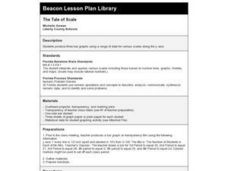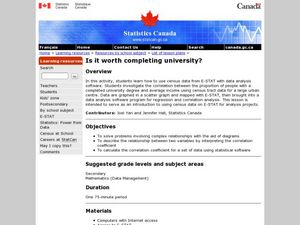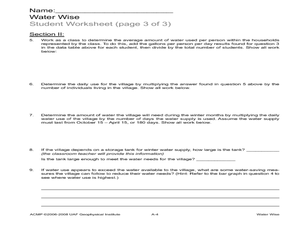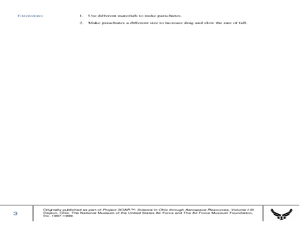Curated OER
Using Active Learning to Reinforce Mathematics
Students predict, then measure how far a bug can travel on a "course" over a specified amount of time, then construct graphs based on the data they acquire.
Intel
Metric Madness
Scholars learn about the metric system and produce a presentation on how to convert within the metric system. They then develop a brochure in support of legislation requiring the use of the metric system.
Curated OER
Sun Friendly Homes
Students design and build a model solar energy home. In this technology lesson, students test the efficiency of their model houses by measuring temperature at regular intervals. They analyze data and share results with the class.
Curated OER
The Tale of Scale
Eighth graders, using a range of data, produce three bar graphs for various scales along the y-axis.
Curated OER
Geo Jammin'
Students compare and contrast related two- and three-dimensional shapes, and complete a Venn diagram illustrating the attributes of each. Using a poem pattern from another lesson, students use data from the diagram to write an attribute...
Curated OER
Raising the Bar While Hogging the Ham (Radio That Is)
Young scholars create a bar graph that communicates an amount without the need to know the exact data, determine what scale to use to best represent the data and use their bar graph to persuade others.
Curated OER
Around the Clock
Middle schoolers discover the relationship between the circumference of a circle and its diameter. They find the length of an arc of a circle.Students use estimation strategies in real-world applications to predict results (i.e.,...
Curated OER
Completing University
Students analyze the pros and cons of completing a 4 year school. In this statistics lesson plan, students complete surveys and use E-STAT to graph their data. They learn to plot and build diagrams.
Curated OER
Diameter, Radius and Area
Students calculate the diameter, radius and area of a circle. In this geometry lesson, students investigate the different ratios of a circle. They calculate the surface are of each circle.
Curated OER
Measuring Elapsed Time
Fifth graders convert units within the same measurement system and be able to determine elapsed time. They are given a start time and an end time of a game. Students determine the amount of elapsed time from the data that is given.
Curated OER
Using Tiles to Solve Word Problems
Young scholars solve problems using equations. In this algebra instructional activity, students identify the correct symbols and steps when solving word problems. They graph their lines and analyze the slope using tiles.
Curated OER
Water Wise
Students calculate their family's water consumption. In this water usage lesson, students discuss the water they use in their homes. Students complete the 'water wise' worksheets to tally their family's use of water. Students answer...
Curated OER
Are You Thirsty? The Effects of Pollution on Drinking Water
Discuss the availability of clean, plentiful water and the causes of water pollution. In groups, sixth graders discuss problem-solving methods for keeping water clean. They explore the function of water treatment plants and perform...
Curated OER
No Title
Sixth graders, after reviewing and studying the basics of recording, analyzing and presenting data, create on graph paper a bar or line graph to represent given data and then interpret the data. They answer questions about the given data...
Curated OER
How is Your Driver Doing?
Sixth graders explore the concept of averaging of numbers and the function of a spreadsheet. Data is collected, analyzed, and displayed in this lesson. The NASCAR race results provides the basis for the collection of data.
Curated OER
Distribution of children living at home
Students examine census data to evaluate the number of students of certain ages living at home. This data is then used to determine the need for day care, or other social programs. They use this information to explore social policies.
Curated OER
Bar Graphs Using M & Ms
Fifth graders observe an overhead of a graph on which M & Ms have been poured out. A volunteer comes up and separates the colors writing on the overhead how many there were of each color and another person labels the graph's title....
Curated OER
Water Quality Monitoring of Natural Water
Students set up their own monitoring system. They collect samples from an appropriate sampling site. They analyze data and determine the water quality. They present their information to the class and draw a conclusion.
Curated OER
Education for Global Peace
Students survey the class and graph the results. In this graphing and data collection lesson, students conduct a survey to see where their shirts were produced. Individuals use software to graph the results and create a written...
Curated OER
Teaching about Increased Conductivity: Are Culverts The Culprits?
Students encounter the complexity of identifying the cause of unusual variations in WOW conductivity data. They propose theories on why there was a sudden increase in conductivity in Ice Lake, Minnesota during July of 1998.
Curated OER
RISKY BUSINESS--OR NOT!
Students learn about the importance and risk that stocks carry within a business. In this financial management lesson, students use role play and case scenario situations to decide what stocks are best for given companies. Based on the...
Curated OER
Wildlife Sampling-Capture-Recapture
Seventh graders simulate the capture-recapture method of population sampling using beans. In this biology lesson, 7th graders calculate the total population of beans in the bowl. They assess whether this method is reliable or not.
Curated OER
Does Weight Affect Drag?
Learners investigate how weight affects a parachute's rate of fall. In this investigative lesson students test parachutes, average results and conclude what makes a faster descent.
Curated OER
How to Make Histograms
Students collect data and plot it using a histogram. In this statistics lesson, students interpret histograms. They find the frequency, percents and density.

























